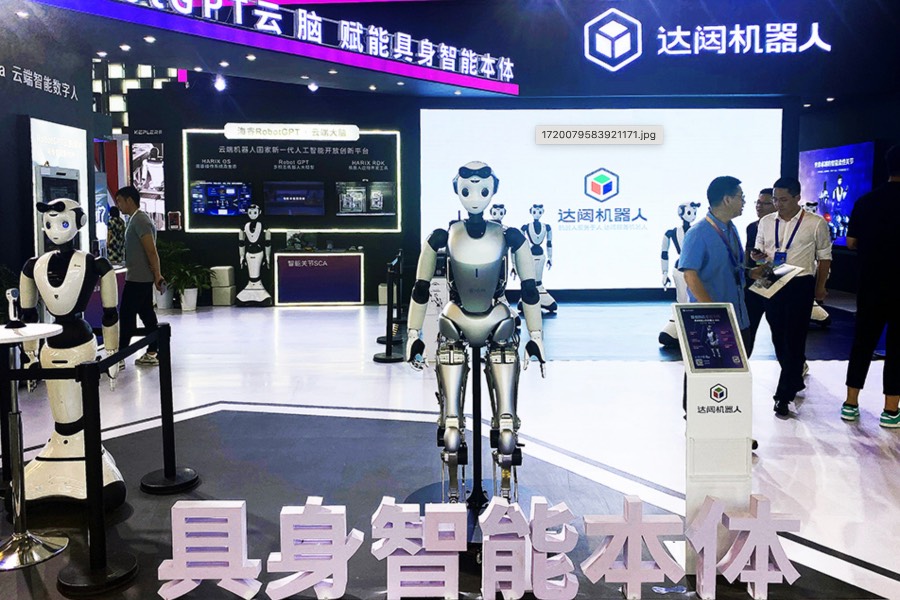Hong Kong Robotics’ stock soars on robotics pivot, but does it have legs?

The unknown Hong Kong-listed company’s stock has jumped to new highs since repositioning itself earlier this year as a robotics firm
Key Takeaways:
- Hong Kong Robotics’ shares have soared on its pivot to robotics, even as it lost HK$140 million last year, its fifth consecutive year in the red
- The company rebranded itself earlier this year when it set up a joint venture with Dataa Robotics
By Lau Chi Hang
Listed companies are always chasing the latest trends, and the newest flavor of the day in Hong Kong has been robotics. Shares of companies like Ubtech Robotics (9880.HK), Dobot (2432.HK) and Horizon Robotics (9660.HK), have been feeding off the frenzy, rising 50% or more in the past year. One standout in the group is Hong Kong Robotics Group Holding Ltd. (0370.HK), a Johnny-come-lately whose stock that has soared more than sixfold this year.
Despite the gains, the company recently released disappointing annual results that showed its revenue fell 45.6% to a meager HK$116 million ($14.78 million) for its fiscal year through March, as its loss widened 5.3% to HK$138 million. It also reported a HK$11.32 million impairment loss on loans and interest receivable, with additional impairment losses on goodwill and property totaling HK$21.82 million and HK$39.37 million, respectively. Those are hardly what you’d expect from such a stellar stock performer.
Robotics joint venture
Such a dismal performance begs the question of why the stock has surged so much. The story dates back to an agreement signed around Valentine’s Day when the company, then called China Best Group, agreed to form a joint venture with China’s Dataa Robotics to explore and develop humanoid robots for civilian uses. China Best Group, which took on its current name in May, was tasked with securing the venture’s financing, while Dataa Robotics provided the technology.
Other unknown Hong Kong companies have made similar pivots to take advantage of hot sectors over the years, often through M&A, banking on resulting surges in their stock prices to quickly raise funds. Hong Kong Robotics could be following that playbook, though whether it will ultimately succeed remains to be seen.
When smartphone maker Xiaomi made its unusual move into electric vehicles (EV), unveiling its first model at the end of 2023, we concluded that given his strong track record with previous similar forays, founder Lei Jun was very likely to deliver strong results. Today, we’ll use a similar approach to assess Hong Kong Robotics’ chances of success with its robotics gambit.
Disappointing previous results
We’ll start with a look at the company’s past record, which is quite spotty. Among other things, it has dabbled in the trading of goods, securities and futures and property. Then, there are forays into heating and cooling supply using geothermal energy, building construction contracting, customized technical support, project management, centralized heating and finance leasing.
The company’s market cap was below HK$600 million ($76 million) earlier this year before the joint venture announcement that sparked its stock rally. Its diffuse business mix at that time probably left many investors scratching their heads, wondering where its focus lay, and how it could possibly operate effectively in so many fields.
Moreover, most of those businesses lost money last year, and some were problematic. A case in point was its heating business in Northwest China’s Shaanxi province, which had to close and was ultimately sold after failing to meet licensing requirements. Its finance leasing business was also forced to shutter due to regulatory violations and had to be sold, and earlier this year the company announced it would sell its financial holding company.
Meantime, its Shaanxi Jiangwei subsidiary, a building contracting business, got caught up in multiple lawsuits that left some of its assets frozen. Its Shanghai Xuanmei Property Agency unit, a real estate broker, also became embroiled in lawsuits involving 1.06 million yuan ($148,000). So many issues with its various units and day-to-day management are hardly encouraging signals pointing to chances for success from its latest robotics foray.
Money-losing partner
We should also take a closer look at Dataa Robotics, which Hong Kong Robotics is calling the secret weapon behind its coming rebirth. In fact, Dataa Robotics is not a nobody company. It was once a leading Chinese robotics firm, boasting high-tech heavyweights SoftBank and Foxconn as investors and a lofty valuation.
The company was founded in 2015 by Huang Xiaoqing, whose resume included tenures at Bell Labs in the U.S. and as the first head of the China Mobile Communications Research Institute. The company specializes in cloud intelligent robotics technologies, and it raised 1 billion yuan in a 2023 series-C financing that valued it at a lofty 22.3 billion yuan.
But the company burned through those funds to support its nascent humanoid robotics business. It was preparing a U.S. listing in 2019, only have the rug pulled from under it after being blacklisted by the U.S. Department of Commerce. With no cash coming in, the company struggled to stay afloat. Its most recent crisis came in April, when media reports said it failed to pay hundreds of employees on time in Shanghai, Beijing and Shenzhen, as its Guangzhou operations were disrupted by water shortages and power outages.
More worrisome than its bleeding money is the fact that Dataa Robotics’ early investors appear to have abandoned the company and are no longer willing to put in more funds. That raises the question of how much assistance a company that is itself on life support can bring to Hong Kong Robotics, and whether the latter will ever be able to operate the new robotics business profitably.
A money race
Most robotics companies still spend far more money than they generate, making ample liquidity key to staying in business. Locally known venture capitalist Allen Zhu Xiaohu once said that the current cost of humanoid robots far exceeds what customers are willing to pay. What’s more, many of their application scenarios are pure creations of manufacturers, often without evidence of underlying demand.
That brings us back to Hong Kong Robotics, which had only HK$50 million in cash as of March, which looks far too small to sustain its new robotics foray. The company announced last month that it would soon enter into four cooperation framework agreements, but how much business can such deals that rely solely on the Hong Kong market really generate?
All that said, the company is still trying to excite investors by playing on the robotics theme, and seems to be having some initial success, based on its huge stock gains. Still, when it will return to profitability is a different issue. The stock surge might embolden the company to try to raise fresh cash in the capital market in the near future. But that could scare off investors, leading to more price volatility. At the end of the day, the stock looks highly speculative right now and is still a far cry from a true robotics play.
To subscribe to Bamboo Works weekly free newsletter, click here





